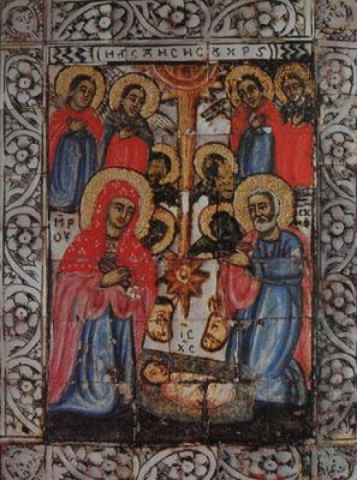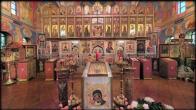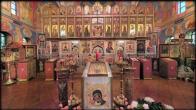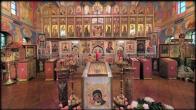You are here
CHRIST IS BORN!

On December 25 (January 7 on the civil calendar) we celebrate the Great Feast of the Nativity, according to the flesh, of our Lord and Savior Jesus Christ. The Church calls upon its faithful to prepare themselves, over the course of a 40-day period, to worthily greet that Feast. However, for those of us living here in the West, in a largely heterodox society, it can be difficult to maintain focus on that preparation. In our society, we are forced to witness the Christmas Feast described as “Winter Holiday,” something preceded by secular rituals including festive parties, songs about a red-nosed reindeer or a magic snowman, frantic shopping expeditions in search of material gifts to give friends and family, Nutcracker Ballet performances, and visits to a jolly white-bearded elf to whom children confide about what gifts they expect to receive at Christmas. Sometimes, almost as an afterthought, there may be a mention that on December 25, the infant Christ was born, and that He is the “reason for the season.”
Our preparation for the Nativity is a quite different one. We are called to observe not a period of secular entertainments, but rather, a 40-day Nativity Fast, during which we abstain from certain forms of food and drink, and during which we turn our attention to the approaching Incarnation. We reflect on a number of questions: Whom are we seeking after, and why? What pitfalls can we anticipate along the way? What will be expected of us when we reach our goal? A good beginning is to remember what we read every day in the Nicene Creed. We believe that our Lord Jesus Christ is the Son of God, begotten of the Father before all ages, of one essence with the Father, and that it was for our salvation that He came down from the Heavens and became man. In his Sermon on the Nativity, IV, St Leo the Great emphasized that had not God deigned to become Incarnate, to take on the form of man, man could not have been saved from death:
“Let the righteous then rejoice in the Lord, and let the hearts of believers turn to God’s praise, and the sons of men confess His wondrous acts... For though all that the Creator expends upon His creature is part of one and the same Fatherly love, yet it is less wonderful that man should advance to divine things than that God should descend to humanity. But unless the Almighty God did deign to do this, no kind of righteousness, no form of wisdom could rescue any one from the devil’s bondage and from the depths of eternal death. For the condemnation that passes with sin from one upon all would remain, and our nature, corroded by its deadly wound, would discover no remedy, because it could not alter its state in its own strength.
In approaching the Divine Infant, we come into the presence of Incarnate God, Who is pre-eternal, Who always was, is, and shall be, Who died for us, Who shall come again to judge the living and the dead, and Whose Kingdom shall have no end! We had been cast out of Paradise, to remain faithful and await the promised Savior, the One Who would conquer death, and through His death and Resurrection, would open to us the path into His Kingdom. Now we are about to stand before Him.
We gaze upon the traditional Icon of the Nativity, and see a vision of Creation transfigured by the Incarnation. We see the three-rayed star In Heaven, pointing down toward the Divine Infant, Who is wrapped in swaddling clothes, lying in the manger, within a cave in a rocky wilderness. He is warmed by the ox and the ass: “The ox knoweth his owner, and the ass his master’s crib, but Israel doth not know, my people doth not consider...” (Isaiah 1:3). The animals recognize their master, while the world has forgotten, and is pursuing earthly entertainments. The Most-holy Theotokos looks on with compassion at Joseph the Betrothed, who is depicted as tempted by the devil to disbelieve the Truth that is beyond rational understanding. That temptation, to fail to accept the Truth, has continued to this day. Just as the Apostle Philip asked Jesus Christ to show him the Father, and had to be reminded that who has seen Christ has seen the Father (John 14:8-10), so many people looking upon the Nativity fail to accept the words of the Prophet Isaiah, who proclaimed “For unto us a child is born, unto us a son is given: and the government shall be upon his shoulder: and his name shall be called Wonderful, Counselor, The mighty God, The everlasting Father, The Prince of Peace...” (Isaiah 9:6). Humanity comes to Incarnate God: Humble shepherds attending their flock come to marvel, while Kings, the three Wise Men, bring gifts appropriate to God and King, and to His Sacrifice. There are also Angels, some rejoicing and raising arms up to Heaven, while others act as heralds of the Nativity, bowing down toward the Divine Infant. What is our place in that image? With what awe and trepidation should we approach? What have we to say to Him? What can we offer Him in thanks for what He has granted us?
As in every case in which we honestly reflect upon ourselves, our rational response should be to bring repentance and ask for His mercy. At the first Vespers of the Nativity Fast, we turn to the Most-holy Theotokos, the New Ark, the vessel in which our Lord and God would come down to us, and ask:
“The weakness and despondency of my soul, do thou transform into health and power, O most immaculate Virgin Mother, that with fear and love I may work and perform the justifications of Christ, that I may escape the unbearable fire, and ever rejoicing, through thee may receive the portion of heaven and life which passeth not away...”
Throughout the Nativity Fast, there are ample opportunities to sharpen our focus on the coming Feast. If during the rest of the year, we have not regularly attended the Vigil services, we can begin to do so. [Strictly speaking, if we are intending to worthily receive Holy Communion, part of our preparation on the eve of that day is to either hear or chant at least the Matins portion of the Vigil.] While the Divine Liturgy is a celebration of the Holy Eucharist, something outside of time, the Vigil takes us on a journey through our history – from the Creation, our fall into sin and subsequent exile, through the time of the Prophets, through the Nativity and the Resurrection, and into the fruits of the Resurrection shown by the Saints, living in the light of Christ. During the Nativity Fast, there are a number of Feast Days celebrating Holy Prophets who prophesied the Incarnation – e.g. Obadiah (November 19), Nahum (December 1), Habakkuk (December 2), Zephaniah (December 3), Haggai (December 16), Daniel and the Three Holy Youths (December 17). We can come to the services, or can read the services texts, and learn the prophetic words that allowed the faithful to keep in mind and maintain their faith in what had been promised so long ago. Additional readings from the Prophets, as well as Epistle and Gospel readings further explaining the meaning of the Nativity of Christ, are read at the Royal Hours.
The path through the Nativity Fast is lengthy. However, a wonderful thing happens very early in the Nativity Fast, during the Vigil for the Entry of the Theotokos into the Temple. After the first ode of the Canon at Matins, we hear a Nativity katavasia:
“Christ is born, give ye glory. Christ comes from heaven, meet ye Him. Christ is on earth, be ye exalted. O all the earth, sing unto the Lord, and sing praises in gladness, O ye people, for He has been glorified!”
The Most-holy Virgin is but three years of age, but as she enters the Holy of Holies, her path to being Theotokos is already set. There are yet weeks before the Feast of the Nativity, but the Incarnation already is. We still await the appearance of pre-eternal God, but all is accomplished; the Kingdom of Heaven is at hand, our salvation is imminent, and we rush to prepare!
During Vespers on the Eve of the Nativity, we hear the sticheron:
“What shall we offer Thee, O Christ, who for our sakes hast appeared on earth as man? Every creature made by Thee offers Thee thanks. The angels offer Thee a hymn; the heavens a star; the Magi, gifts; the shepherds, their wonder; the earth, its cave; the wilderness, the manger; and we offer Thee a Virgin Mother. O pre-eternal God, have mercy upon us.”
Mankind offers to God the Virgin Mother. What, concretely, can we do in support of our plea for God’s mercy? We can see Christ in everyone we encounter. We can strive to help the least of the brethren (Matthew 25:40). We can strive to walk in the law of the Lord (Psalm 118[KJV119]:1. In short, we can strive to experience a metanoia, a change of being, and walk toward the cave to bow down before our pre-eternal God, and with the Church to sing, “Christ is born, give ye glory!”
Protodeacon Leonid Mickle
PARISH LIFE
RECENT VIDEOS
Address of our Cathedral
Subscribe to our mailing list
While all the materials on this site are copyrighted, you may use them freely as long as you treat them
with respect and provide attribution on the Russian Orthodox Cathedral of St.John the Baptist of Washington DC.









